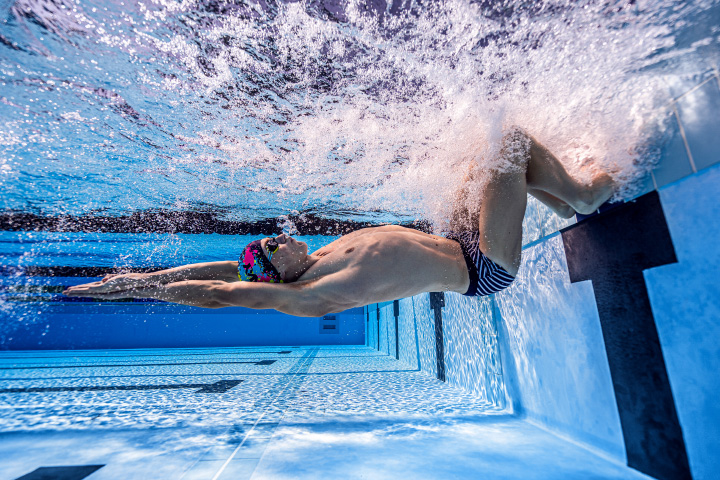This swimming release is courtesy of TritonWear, a SwimSwam partner.
Doing the right work, in the right quantity and intensity, and at the right time is the fastest way to improve. But where do you start?
Improving is an iterative process; it requires a series of steps that you repeat. Setting goals, tweaking and optimizing your readiness, focus and intensity and adjusting your training.
We developed Focused Iterative Training, FIT, to help you improve in 3 simple steps: observe, discover and adjust. The first step is to start tracking all your workouts and spend some time learning your metrics.
Learn more: Get FIT with TritonWear.
Why is an observation period essential?
During the observation step, you’ll learn how to capture accurate data, interpret the Triton Score, select your favorite metrics, engage with real-time data and leverage data after practice. We recommend tracking roughly 4 weeks to establish training trends before starting to make data-driven decisions.
- Capturing accurate data.
You have your TritonWear, and you are ready to hit that first workout. Before you do, it is important to practice correct unit placement as any position or orientation variation will influence data accuracy. A successful unit placement has three critical components: position, orientation, and consistency.
The unit should be positioned below the widest part of your head, just above the nape of the neck. The orientation should be vertically and in the head’s center. Lastly, aim to place your unit the same way for every workout. Being consistent will help the algorithm recognize your specific movements and create your unique swimming profile. Furthermore, strong starts and finishes, swimming the prescribed workout, and hitting the right pace times are excellent practices that help collect quality data.
- Interpreting Triton Score.
During this initial period, the goal is to get to know the Triton Score and its changes over time. In the app, you can view the Triton Score, along with each of your readiness, focus and intensity scores. Each one will show you how much focus you put on skills as well as how intensely and how safely you are training every workout.
An observation period will allow you to notice how training habits, workout objectives, external factors (nutrition, sleep etc.) affect the Triton Score.
For example:
- Training habits may impact your Focus Score. It’s essential to maintain technique under intense sets. It’s easy to compromise skill focus for intensity.
- Intensity per stroke score may appear high if the focus was to train the best stroke. The app would reflect just that. The total Intensity Score, however, will not be affected. The algorithm tracks what strokes you did that practice and how much of the workout was spent performing each stroke.
- Lack of sleep or insufficient nutrition may impact your Intensity Score. Feeling tired, sore, or without energy will affect how you feel in the water and your ability to respond to the workout. During these off practices, it’s important to focus on skills.
- Selecting your favorite metrics.
By default, there are six favorite metrics. We’ve selected the most foundational metrics for every phase (transition, underwater, overwater). They are an excellent start on what to aim to improve first.
It’s good practice to spend some time analyzing performance in each metric before changing them. Over time, you can dive deeper into your data and incorporate other metrics for more targeted training.
The time you spend will give you the insight you need to set smart goals. What metrics you choose will largely depend on your short-term and long-term goals. You will need to communicate with your coach to make sure that goals and training scope are aligned. You can always change and customize your favorite metrics at any given time.
- Engaging with real-time data.
Real-time data gives high-level insight into your swimming profile. Monitoring metrics closely will help you develop accountability over your performance. You will start seeing trends across metrics you excel in and identify others you need to improve on. This enables fine-tuning of workouts for more targeted training. Lastly, engage with real-time data and have fun with metric-focused swim-offs, practices, or games.
- Leveraging data after practice.
Analyzing data and turning them into actionable steps on your own can be time-consuming and challenging to manage. Our app breaks that data down into digestible scores and personalizes feedback to make it easier for you. Reflecting on the workout, keeping a journal, recording the RPE and interpreting the Triton Score are some of the best practices for drastic improvements.
About TritonWear
TritonWear is a technology company developing training solutions for athletes and coaches. The company’s product platform consists of a non-invasive device that calculates a suite of performance metrics and streams that data in real-time to a tablet. Co-founders, Tristan Lehari and Darius Gai, based in Toronto, developed their flagship product while participating in the University of Waterloo’s Velocity program. TritonWear was founded in 2014.
This swimming release is courtesy of TritonWear, a SwimSwam partner.

